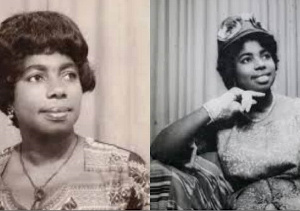Born in 1935 to parents who lived in the Western Region, Felicia Abban grew up knowing the then budding trade of photography because that was her father’s trade.
When she opted to understudy her father, little did she know that she would go on to become the official photographer of Ghana’s first Prime Minister and later President, Osagyefo Dr. Kwame Nkrumah.
A throwback of Felicia’s feat was shared on Twitter by SUNU journal, a Journal of African Affairs, Critical Thought and Aesthetics. Their SUNU notes is known to be a repository of archival and contemporary material.
SUNU Journal wrote about Felicia: “On this day March 6th in 1957, Ghana gained independence from British rule. Felicia Abban is Ghana’s first professional female photographer.
“Known for her classic studio and self-portraits, she was also the official photographer of Ghana’s first President, Kwame Nkrumah.”
The post was accompanied by a portrait of Abban taken in her studio in Accra, Ghana, 1966 for the December 1966 issue of DRUM Magazine.
Felicia’s professional life was truncated by arthritis according to history but it wasn’t until she had chalked five decades doing photography.
She is reputed to have worked as a photographer for Kwame Nkrumah, for many years during the 1960s.
Ghanaianmuseum.com details that, as a toddler, Felicia Ansah Abban frequented her father’s photography studio in Sekondi-Takoradi, Western region, where she was born in 1935.
Being the eldest of six children, Abban became her father’s apprentice at the age of 14 and spent the next four years working under his meticulous and methodological eye before leaving her hometown for Accra at 18 as a newly married young woman to set up her own photo studio.
Felicia was married to Robert Abban (late), the man who designed the fabric which had Kwame Nkrumah’s portrait designed on flowers with Ghana map for Ghana’s Independence Day celebrations in 1957.
According to Ghanaianmuseum.com, the first public display of her work was staged at ANO’s gallery in March 2017 and the gallery has plans of transforming her studio into a museum in her honour.
Abban’s private photo collection consists of photos she often takes of herself before she attended events.
 Home Of Ghana News Ghana News, Entertainment And More
Home Of Ghana News Ghana News, Entertainment And More





